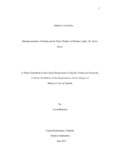Please use this identifier to cite or link to this item:
https://elibrary.tucl.edu.np/handle/123456789/2827Full metadata record
| DC Field | Value | Language |
|---|---|---|
| dc.contributor.author | Bhattarai, Ujwal | |
| dc.date.accessioned | 2018-12-11T05:28:20Z | |
| dc.date.accessioned | 2021-07-23T04:22:22Z | - |
| dc.date.available | 2018-12-11T05:28:20Z | |
| dc.date.available | 2021-07-23T04:22:22Z | - |
| dc.date.issued | 2017-06 | |
| dc.identifier.uri | http://elibrary.tucl.edu.np/handle/123456789/2827 | - |
| dc.description.abstract | The research critically examines misrepresentation of Zambia and it's both people and culture in Christina Lamb's The African House. Colonial mentality regarding others has been shown in the novel and by using negative adjectives Zambian society has been represented. Lamb presents colonial mission of the major character Browne to Zambia reveals his thought, perspective and preconception about Africa and particularly Zambia. Browne sees Zambia wherein he only finds poverty, slum area, uncivilized manner, ignorant people, restlessness, fighting, war, suffering and crying and it has been emphasized to represent the country. He never uses changed and new perspective over Zambia and their civilization. Browne reinforces and recreates discourses regarding African as well as Zambia. Majorly, Hall and Foucault's ideas have been used theoretically who profess representation concept that discourse and representation are same dimensions as to creating truth for others | en_US |
| dc.language.iso | en_US | en_US |
| dc.publisher | Central Department of English Kirtipur, Kathmandu | en_US |
| dc.subject | African American culture | en_US |
| dc.subject | Native People | en_US |
| dc.subject | Africa | en_US |
| dc.subject | Zambia | en_US |
| dc.title | Misrepresentation of Zambia and Its Native People in Christina Lamb's The Africa House | en_US |
| dc.type | Thesis | en_US |
| Appears in Collections: | English | |
Files in This Item:
| File | Description | Size | Format | |
|---|---|---|---|---|
| Ujjal Bhattarai (Autosaved).pdf | 199.26 kB | Adobe PDF |  View/Open |
Items in DSpace are protected by copyright, with all rights reserved, unless otherwise indicated.
